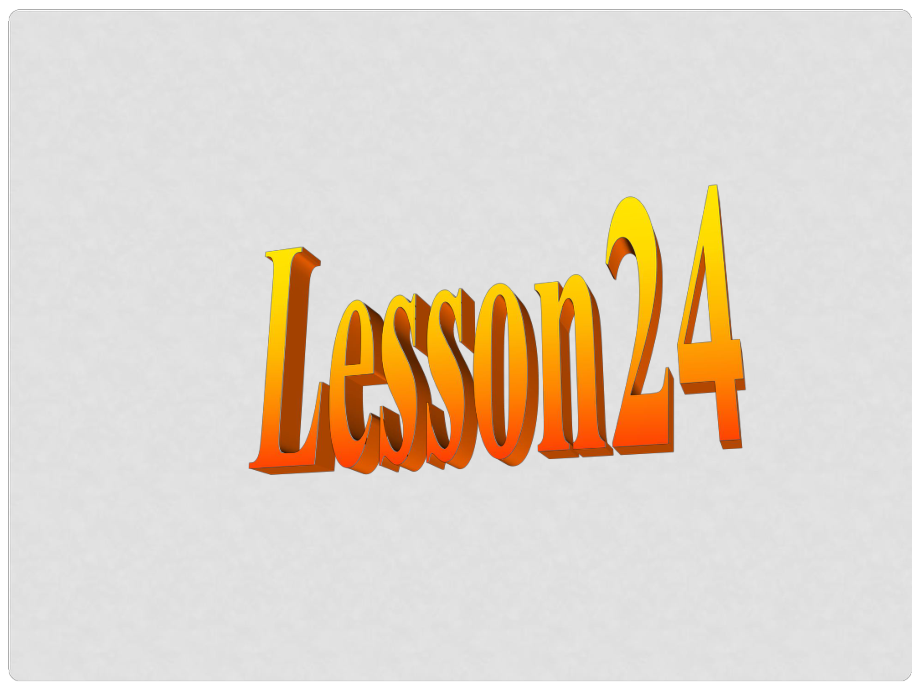《河南省濮陽(yáng)市南樂縣張果屯鄉(xiāng)中學(xué)七年級(jí)英語(yǔ)下冊(cè) Lesson 24課件 冀教版》由會(huì)員分享���,可在線閱讀��,更多相關(guān)《河南省濮陽(yáng)市南樂縣張果屯鄉(xiāng)中學(xué)七年級(jí)英語(yǔ)下冊(cè) Lesson 24課件 冀教版(11頁(yè)珍藏版)》請(qǐng)?jiān)谘b配圖網(wǎng)上搜索���。
1��、there be結(jié)構(gòu)的用法�。結(jié)構(gòu)的用法��。要注意下列八種情況:要注意下列八種情況:(1)“There be +主語(yǔ)主語(yǔ) +地點(diǎn)(或時(shí)間)地點(diǎn)(或時(shí)間)狀語(yǔ)狀語(yǔ)”表示表示“這里有這里有”���。there 是是引導(dǎo)詞���,無(wú)詞義,引導(dǎo)詞��,無(wú)詞義��,be是謂語(yǔ)動(dòng)詞���,主是謂語(yǔ)動(dòng)詞���,主語(yǔ)位于語(yǔ)位于be之后。主語(yǔ)是單數(shù)���,動(dòng)詞變之后��。主語(yǔ)是單數(shù)���,動(dòng)詞變?yōu)闉閕s�,是復(fù)數(shù)�,是復(fù)數(shù),be變?yōu)樽優(yōu)閍re��。如:���。如:There is a boat in the river. 河里河里有條船��。有條船���。There are some flowers near the house. 房子附近有些花�。房子附近有些花。(2) There b
2���、e結(jié)構(gòu)中�,主語(yǔ)若是不可數(shù)名詞��,謂語(yǔ)動(dòng)結(jié)構(gòu)中,主語(yǔ)若是不可數(shù)名詞�,謂語(yǔ)動(dòng)詞詞be用單數(shù)用單數(shù)is。如:��。如: There is some water in the glass. 杯里有些水�。杯里有些水。There is some bread on the table. 桌上有些面包��。桌上有些面包�。(3) There be結(jié)構(gòu)中,若主語(yǔ)不止一個(gè)���,結(jié)構(gòu)中���,若主語(yǔ)不止一個(gè),be的形式一的形式一般根據(jù)第一個(gè)主語(yǔ)來(lái)定��,單數(shù)或不可數(shù)名詞用般根據(jù)第一個(gè)主語(yǔ)來(lái)定���,單數(shù)或不可數(shù)名詞用is��,復(fù)數(shù)�,復(fù)數(shù)用用are�。在英語(yǔ)中這叫���。在英語(yǔ)中這叫“就近原則就近原則”。如:��。如:There is a house, four
3���、trees and some hills in the picture.畫里有一幢房子���,四棵樹和幾座小山。畫里有一幢房子��,四棵樹和幾座小山�。There are some books, two pens and a ruler on the desk. 書桌上有些書,兩支筆和一把尺�。書桌上有些書,兩支筆和一把尺���。(4) There be 結(jié)構(gòu)的否定式�,是在結(jié)構(gòu)的否定式�,是在be后加后加not��。如:�。如:There is not a car in the picture. 畫里沒有小畫里沒有小汽車。汽車。There are not any children in the river. 河里沒有孩子
4���、��。河里沒有孩子��。(5) There be 結(jié)構(gòu)的一般疑問句��,是將結(jié)構(gòu)的一般疑問句���,是將be提到提到there前,回答用簡(jiǎn)略形式���。如:前���,回答用簡(jiǎn)略形式。如:- Is there a map on the wall? 墻上有地圖嗎���?墻上有地圖嗎���?- Yes, there is. (No, there isnt.) 是的,有�。是的��,有��。(不���,沒有。)(不���,沒有��。)- Are there any birds in the trees? 樹上有樹上有鳥嗎���?鳥嗎?- Yes, there are. (No, there arent.) 是的��,是的���,有��。(不�,沒有���。)有���。(不,沒有���。)(6) 若對(duì)若對(duì)th
5�、ere be結(jié)構(gòu)中的主語(yǔ)提問���,則結(jié)構(gòu)中的主語(yǔ)提問�,則把疑問詞把疑問詞what放在句首��,后接放在句首��,后接“be + there + 狀語(yǔ)���?狀語(yǔ)�?”��,此時(shí)�,此時(shí)there常被省略。常被省略�。如:如:There is a house near the river.(對(duì)(對(duì)劃線部分提問)劃線部分提問) 河邊有座房子。河邊有座房子��。Whats (there) near the river?There are two men in the room. (對(duì)(對(duì)劃線部分提問)劃線部分提問) 房間里有兩個(gè)男人。房間里有兩個(gè)男人��。What are (there) in the room?(7) 若對(duì)若對(duì)the
6�、re be主語(yǔ)的定語(yǔ)提問,則用句型主語(yǔ)的定語(yǔ)提問��,則用句型“How many (much) +主語(yǔ)主語(yǔ) + are (is) +there +狀語(yǔ)��?狀語(yǔ)���?”��,主語(yǔ)是可數(shù)名詞用主語(yǔ)是可數(shù)名詞用How many���,主語(yǔ)是不可數(shù)名詞則,主語(yǔ)是不可數(shù)名詞則用用How much���。如:�。如:There are five bottles on the table. (對(duì)劃線部(對(duì)劃線部分提問)分提問) How many bottles are there on the table? 桌上桌上有幾只瓶子�?有幾只瓶子?There is some meat in the bowl. (對(duì)劃線部分提(對(duì)劃線部分提問)
7�、問) How much meat is there in the bowl? 碗里有多少碗里有多少肉?肉?(8) There be 結(jié)構(gòu)表示泛指���,主語(yǔ)前結(jié)構(gòu)表示泛指��,主語(yǔ)前一般不能用表示特指的詞如一般不能用表示特指的詞如the, my, this 來(lái)修飾。如:來(lái)修飾�。如:There is the clock on the wall. 此此句應(yīng)改為:句應(yīng)改為: There is a clock on the wall. 墻上墻上有只鐘。有只鐘�。達(dá)達(dá)標(biāo)標(biāo)測(cè)測(cè)評(píng)評(píng)1.There are _ cars and buses on the street.A. too much B. much too C.
8、 many too D. too many2.I see some men _ pictures at Tiananmen Square. A. takes B. taking C. to take D. took3.They are _. They laugh _.A. loud, loud B. loudly, loudly C. loud, loudly D. loudly, loud4._ is he? He is fine.A. What B. How C. Who D. How old5.Do you know _?A. what is a computer B. where is
9��、 the computer C. what a computer is D. how is the computerDBCBC6.I am coming home to Canada _ February sixth.A. at B. in C. on D. /7._ is the weather in Canada?A. What B. How C. What about D. How about8.Danny, Jenny and Li Ming are at Tiananmen Square. They feel very _ and excited.A. happily B. happ
10�、y C. scared D. sad9.She is _. She does her homework very _.A. carefully, carefully B. careful, careful C. careful, carefully D. carefully, careful10.Which is _, an e-mail or a letter?A. quick B. quickly C. quicker D. quickestCCCBB句型轉(zhuǎn)換。1.How is the weather in Canada?(改為同義句) _ is the weather _ in Cana
11��、da?2.The stamp is one yuan.(對(duì)劃線部分提問) _ _ is the stamp?3.I need no envelope and no pen(改為同義句) I _ need _ envelope _ pen.4.We are having fun in Beijing.(改為同義句) We are _ _ _ _ in Beijng.5.I put the address on the right of the postcard.(對(duì)劃線部分提問) _ _ you put the address?1.What like 2.How much 3.dont any or 4.having a good time 5.Where do
 河南省濮陽(yáng)市南樂縣張果屯鄉(xiāng)中學(xué)七年級(jí)英語(yǔ)下冊(cè) Lesson 24課件 冀教版
河南省濮陽(yáng)市南樂縣張果屯鄉(xiāng)中學(xué)七年級(jí)英語(yǔ)下冊(cè) Lesson 24課件 冀教版

